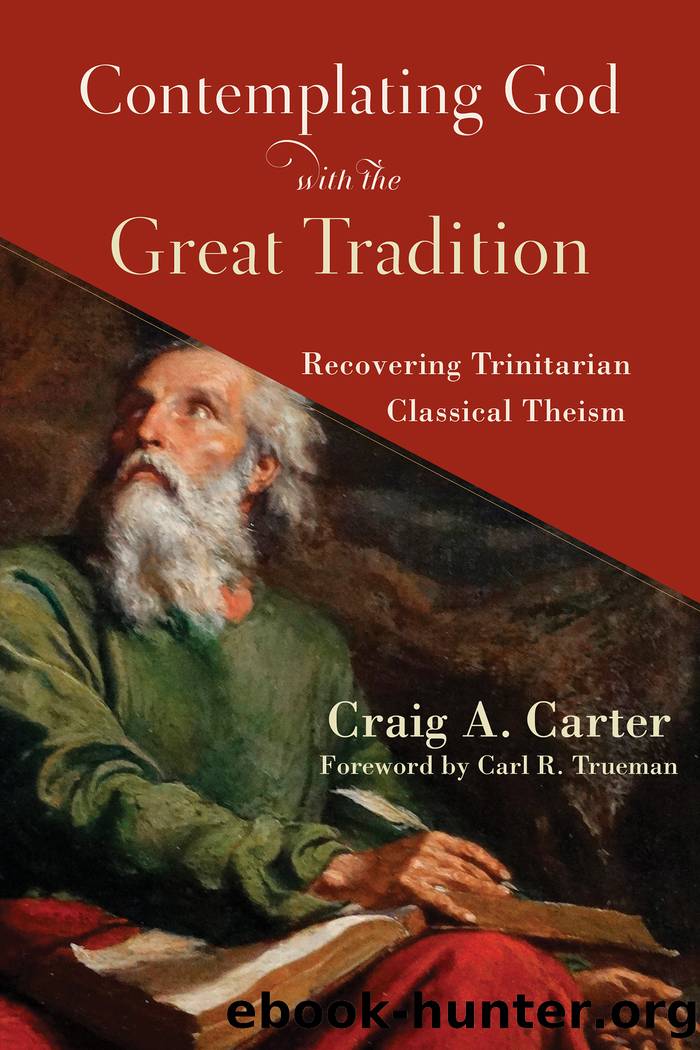Contemplating God with the Great Tradition by Craig A. Carter

Author:Craig A. Carter
Language: eng
Format: epub
Tags: Theology;Trinity—Biblical teaching;Trinity—History of doctrines;Theism;REL067000;REL067110
ISBN: 9781493429691
Publisher: Baker Publishing Group
Published: 2021-03-05T00:00:00+00:00
Predictive Prophecy and the Philosophy of History
The revisionist doctrines of God we discussed in chapter 1 all presuppose the impossibility of predictive prophecy because the god they describe is, himself, a part of the historical process and not transcendent over it. In contemporary historical-critical scholarship, the question of revelation is troubled. In fact, it would not be an overstatement to say that the concept of revelation has been largely elided in liberal biblical scholarship, even though some liberal scholars, such as Mark S. Smith, continue to use the word. But what Smith means by ârevelationâ is quite different from what it meant to the church fathers, medieval schoolmen, Protestant Reformers, modern evangelicals, and all those upholding Nicene trinitarian orthodoxy from all branches of Christianity.
Smith uses the term ârevelationâ as a follower of Schleiermacher would do. For Smith, ârevelationâ is human experience expressed in metaphors to construct ideas of God that reflect our experience of the world. For example, he claims that the polytheistic concept of God as head of a divine family changed in the situation of the Assyrian threat in the seventh century BC and the exile. Summarizing this process, he writes of changes in Israelite society, âThe family no longer functioned as the sole or primary mode of social identification, . . . and correspondingly the Israelite god could be seen as the individual deity responsible for the operation of the universe.â17 My point is not whether this particular argument makes sense; rather, I wish to highlight the method that Smith uses to understand ârevelation.â In no sense is revelation for him a matter of humans receiving information (truth) from God about reality. Rather, it is a matter of projecting metaphors drawn from human experience onto the divine. Feuerbachâs critique of religion as projection seems to apply to this approach quite clearly; he says,
In the divine omniscience man merely fulfils his own desire to know everything or objectifies the faculty of the human mind to be everywhere at once. . . . In other words, God is nothing other than the future immortal man, differentiated from man as he exists at present in the body and flesh, and conceived of as an independent being.18
As an atheist, Feuerbach would say that the seventh-century Israelite writers were simply projecting their own experience onto a mythical cosmic figure they called âGodâ and thus were giving expression to their aspirations. Naturally, Feuerbach would say, there is no reason to think that such a being exists in reality. I would reply to Feuerbach that it is not the biblical writers doing this but rather the modern critics.
Later Smith says that the monotheism we see reflected in Exodus is really a later imaginative construct imposed back onto Israelâs mythic origins as an act of âmemoryâ rather than history.19 He criticizes those who insist that truth must be historical, saying that they are guilty of an âidolatry of history.â20 Smith admits that some basic biblical events stand on biblical claims that they actually occurred, but
Download
This site does not store any files on its server. We only index and link to content provided by other sites. Please contact the content providers to delete copyright contents if any and email us, we'll remove relevant links or contents immediately.
The Secret Power of Speaking God's Word by Joyce Meyer(3152)
Signature in the Cell: DNA and the Evidence for Intelligent Design by Stephen C. Meyer(3121)
Real Sex by Lauren F. Winner(3001)
The Holy Spirit by Billy Graham(2938)
The Gnostic Gospels by Pagels Elaine(2515)
Jesus by Paul Johnson(2347)
Devil, The by Almond Philip C(2322)
23:27 by H. L. Roberts(2241)
The Nativity by Geza Vermes(2220)
Chosen by God by R. C. Sproul(2155)
All Things New by John Eldredge(2149)
Angels of God: The Bible, the Church and the Heavenly Hosts by Mike Aquilina(1948)
The Return of the Gods by Erich von Daniken(1925)
Angels by Billy Graham(1915)
Knowing God by J.I. Packer(1844)
Jesus of Nazareth by Joseph Ratzinger(1797)
The Gnostic Gospel of St. Thomas by Tau Malachi(1779)
How To Be Born Again by Billy Graham(1775)
Evidence of the Afterlife by Jeffrey Long(1773)
